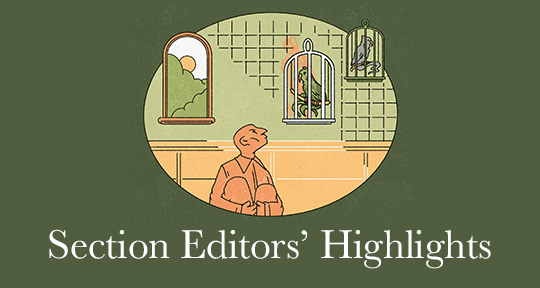Gathering new work from 43 countries, the Winter 2022 edition might be overwhelming at first. But don’t let that stop you from diving right in! Whether you consume the issue from cover to cover or click on whatever catches your fancy, we just hope you enjoy reading this eleventh anniversary edition as much as our section editors have loved putting it together! Here to tell you more about their lineups are Yew Leong, Barbara, Bassam, and Caridad. If, after reading the issue, you’re inspired to submit work, don’t forget that we welcome submissions all year round; if you are a Swedish-English translator, take note that we’re currently inviting submissions to a paid Swedish Literature Feature, slated for publication in Spring 2022. For guidelines on how to submit, go here.
From Lee Yew Leong, Fiction, Poetry, Special Features, and Interview Editor:
The statistics are undeniable: With one language dying every two weeks, ninety percent of all languages will go extinct within the next one hundred years. Even as we at Asymptote celebrate another milestone with our most diverse issue yet, loss—specifically that of entire worlds indexed by languages—is never quite far from our minds. In Dear You, translated brilliantly by Samantha Farmer, Croatian author Jasna Jasna Žmak takes us on a playful thought experiment inspired by Barthes: ”What if one word was removed each time a speaker of its language died as an act of remembrance?” Intended as an enjoinder to Eliot Weinberger’s essay published in these very pages one year ago, Yeshua G. B. Tolle’s submission to this issue’s Brave New World Literature Feature examines Aaron Zeitlin’s poetry, written in a language “half of whose speakers had been wiped off the face of the earth” when Nazis invaded his native Poland. “On what world do we gaze,” he asks poignantly, ”when the poet himself believes the world is over?” Whole worlds are rendered believably before our eyes in Matt Reeck’s skillful rendering of Rachid Djaïdani’s 1999 classic of banlieue literature that smashed Parisian tropes, and in Kim Su-on’s atmospheric science fiction brought to us by talented translators Spencer Lee-Lenfield and Lizzie Buehler. My two personal highlights from the Poetry section couldn’t be more diametrically apposite: the first (the Kazakh poet Anuar Duisenbinov) is as light (and alive with defiance) as the second (Spanish poet Pepe Espaliú) is weighted (with clear-eyed acceptance of inevitable death); both are powerful and moving. Rounding up the issue’s stellar lineup, Neske Beks and Charlotte Van den Broeck (in the Flemish Literature Feature I curated) as well as Jamaican-born artist Cosmo Whyte (in the Visual section, which Eva Heisler assembled) make important contributions to the conversation on our collective racial past.
From Barbara Halla, Criticism Editor:
In many reviews, the very act of translation can feel like an afterthought; usually reviewers will include a short line or paragraph to acknowledge the deftness of the translator’s skill, but that will be the extent of their engagement. I can understand why that happens: at times, without some familiarity with the original, it can feel impossible to speak in detail about the translator’s craft—which is why Tom Abi Samra’s review of Huda J. Fakhreddine and Jayson Iwen’s translation of Salim Barakat’s poetry is such a revelation. In his review, the translation features front and center, as Abi Samra investigates how Barakat’s attempt to defamiliarize Arabic is rendered into English, doing an almost phrase-by-phrase analysis of the translation. There are some texts, however, where the reviewer does not have a choice but to engage with the translator, because the very book they are reviewing questions the porous borders between author and translator. This is the case with Catherine Fisher’s fascinating review of Tomaž where Joshua Beckman appears not merely as a translator, but as a co-writer having had a direct hand in choosing how to present Tomaž Šalamun’s poetry into English. READ MORE…

